|
|
|
Sort Order |
|
|
|
Items / Page
|
|
|
|
|
|
|
| Srl | Item |
| 1 |
ID:
087033
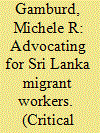

|
|
|
|
|
| Publication |
2009.
|
| Summary/Abstract |
Nearly a million Sri Lankan women labor overseas as migrant workers, the vast majority in the Gulf Cooperation Council (GCC) countries in West Asia. They are poorly paid and vulnerable to a wide variety of exploitative labor practices at home and abroad. Despite the importance of worker remittances to Sri Lanka's national economy, and in spite of the nation's history of organized labor and active political participation, migrants have received only anemic support from the state, labor unions, feminist organizations, and migrant-oriented nongovernmental organizations. The article contextualizes Sri Lankan migration within larger-scale economic dynamics (such as global capitalist policies and processes) and local-level ideological formations (such as local political histories and culturally shaped gender norms). The author argues that political freedoms in destination countries have a significant effect on organizing activities in both host and sending nations. Comparing the Sri Lankan and Philippine situations, the author contends that the vibrant activism in the Philippines correlates with the liberal organizing climates in the European Union and in East and Southeast Asia, while the paucity of organizing in Sri Lanka correlates with the strict repression of guest workers in the GCC. Compared to other destinations, the GCC countries give workers (particularly women) less chance for autonomous activities, are less open to labor organizing, and are less responsive to political protest.
|
|
|
|
|
|
|
|
|
|
|
|
|
|
|
|
| 2 |
ID:
122346
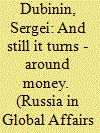

|
|
|
|
|
| Publication |
2013.
|
| Summary/Abstract |
It is the common wealth, or the accumulated and permanently growing public wealth that has real significance. A growing national economy as such is a factor of attraction. Broadening markets promise lucrative contracts to any economic partner.
|
|
|
|
|
|
|
|
|
|
|
|
|
|
|
|
| 3 |
ID:
127778
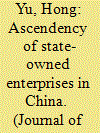

|
|
|
|
|
| Publication |
2014.
|
| Summary/Abstract |
The state sector still plays an important role in China's economy. One of the key development phenomena characterizing the Chinese economy is the rapid ascendency of state-owned enterprises (SOEs) and the resurgence of the state. The strength of China's SOEs is projected in the centrally administrated state-owned enterprises (CSOEs). They are the backbone of the national economy, spearheading national economic development and Beijing's 'going-out' strategy. The CSOEs have expanded their reach and increased their power, domestically and globally. In seeking to boost local GDP growth, the eastern provinces in China have joined the western provinces in a fierce contest to attract investment from SOEs. Nevertheless, the rapid ascendency of the SOEs has brought many negative consequences for China's economic, social and political development by causing conflict with the market-oriented development direction of Chinese economic reform and hindering fair competition between state-owned and non-state-owned enterprises.
|
|
|
|
|
|
|
|
|
|
|
|
|
|
|
|
| 4 |
ID:
092211
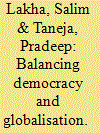

|
|
|
|
|
| Publication |
2009.
|
| Summary/Abstract |
Contemporary globalisation is viewed both as offering immense opportunities and posing a fundamental threat to the nation-state and democratic governance. To the proponents of globalisation, integration into the world economy through liberalisation of foreign trade and capital flows, combined with deregulation of the national economy, promises greater economic efficiency, higher consumption levels and generally improved living standards. For them, state intervention in the economy aimed at restricting the free play of market forces is dysfunctional, resulting in lower social and economic benefits for the population at large. Within this optimistic perspective, globalisation is thought likely to 'flatten' economic differences between nations1 and lead to a 'borderless world',2 where the barriers to flows of capital, technology, and information will be minimised if not totally removed.
|
|
|
|
|
|
|
|
|
|
|
|
|
|
|
|
| 5 |
ID:
168366
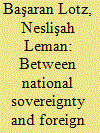

|
|
|
|
|
| Summary/Abstract |
This article examines how the economic concessions given to foreign companies during the Ottoman Empire were assumed by the new Turkish Republic and readjusted under the new circumstances that arose after the First World War. Using mainly the documents of the French diplomatic archives and of the Turkish state, the article focuses on the negotiations between the Turkish government in Ankara and the representatives of the French companies, in the summer of 1923. Taking into account the nationalist ideas of the new Turkish government, the European governments and companies were concerned about the economic path that young Turkey would follow and they were worried about their economic interests in this country. The article puts forward that the rigorous attitude of the Turkish government regarding national sovereignty and political independence was a determining factor in these first years of the new regime but did not constitute an obstacle to the privileges of the foreign capital in Turkey.
|
|
|
|
|
|
|
|
|
|
|
|
|
|
|
|
| 6 |
ID:
093237
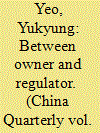

|
|
|
|
|
| Publication |
2009.
|
| Summary/Abstract |
This study explains the institutional structure and mechanism of economic regulation in China's telecommunications basic service industry. The case of telecoms basic service provides an excellent window to explore how Chinese leadership governs strategic state sectors whose assets and profits are central to the national economy. Challenging the ideational model of independent regulator, this study argues that the State-owned Assets Supervision and Administration Commission (SASAC) explains much of the telecoms business regulation, as the authority of the Ministry of Information Industry has been circumscribed by other party-state institutions. The SASAC's regulatory power suggests that the primary goal of the Chinese industrial economy is the best protection of state assets through the creation of large and strong state firms, not the protection of consumers' interests by breaking up the monopoly in markets.
|
|
|
|
|
|
|
|
|
|
|
|
|
|
|
|
| 7 |
ID:
111942
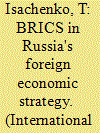

|
|
|
|
|
| Publication |
2012.
|
| Summary/Abstract |
IN THE CONTEXT of an analysis of the prospects and priorities of Russia's foreign economic policy, there has recently been an increased discussion of economic cooperation within BRICS (Brazil, Russia, India, China, and South Africa, the newest member of the group). It should be emphasized that the BRICS cooperation problem itself is not new, but until now all questions have been viewed through the prism of political cooperation and the development of a common platform on the key issues of the world order. The economic aspects of cooperation among the BRICS countries have become a subject of investigation relatively recently and there are still no clear assessments.
|
|
|
|
|
|
|
|
|
|
|
|
|
|
|
|
| 8 |
ID:
044691
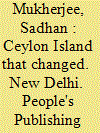

|
|
|
|
|
| Publication |
New Delhi, People's Publishing House, 1971.
|
| Description |
xiii,135p.hbk
|
|
|
|
|
|
|
|
|
|
|
|
Copies: C:1/I:0,R:0,Q:0
Circulation
| Accession# | Call# | Current Location | Status | Policy | Location |
| 007148 | 954.9303/MUK 007148 | Main | On Shelf | General | |
|
|
|
|
| 9 |
ID:
039476
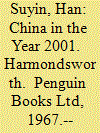

|
|
|
|
|
| Publication |
Harmondsworth, Penguin Books Ltd, 1967.
|
| Description |
254p.pbk
|
|
|
|
|
|
|
|
|
|
|
|
Copies: C:1/I:0,R:0,Q:0
Circulation
| Accession# | Call# | Current Location | Status | Policy | Location |
| 016170 | 951/HAN 016170 | Main | On Shelf | General | |
|
|
|
|
| 10 |
ID:
140137
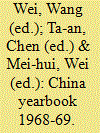

|
|
|
|
|
| Publication |
Taipei, China Publishing Co.,
|
| Description |
832p.hbk
|
|
|
|
|
|
|
|
|
|
|
|
Copies: C:1/I:0,R:0,Q:0
Circulation
| Accession# | Call# | Current Location | Status | Policy | Location |
| 004075 | 951.05/WEI 004075 | Main | On Shelf | General | |
|
|
|
|
| 11 |
ID:
131065
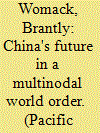

|
|
|
|
|
| Publication |
2014.
|
| Summary/Abstract |
Over the next twenty years China is likely to become the world's largest national economy, though not the richest one-fifth of the world's population. Chinese demographic power will be qualitatively different from American technological power despite bottom-line similarities in GNP, and China will face challenges of political and economic sustainability. Assuming that globalization, constrained state sovereignty, and demographic revolution continue as basic world trends, the world order is likely to be one in which concerns about conflicts of interests drive interactions, but no state or group of states is capable of benefitting from unilaterally enforcing its will against the rest. Thus, there is no set of "poles" whose competition or cooperation determines the world order, despite the differences of exposure created by disparities in capacity. Although the United States and China will be the primary state actors and their relationship will contain elements of rivalry as well as cooperation, the prerequisites of Cold War bipolarity no longer exist. Rather, the order would be best described as "multinodal," a matrix of interacting, unequal units that pursue their own interests within a stable array of national units and an increasing routinization of international regimes and interpenetrating transnational connections
|
|
|
|
|
|
|
|
|
|
|
|
|
|
|
|
| 12 |
ID:
050112
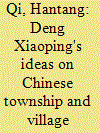

|
|
|
|
|
| Publication |
Jan-March 2004.
|
|
|
|
|
|
|
|
|
|
|
|
|
|
|
|
| 13 |
ID:
110269
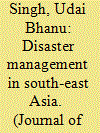

|
|
|
|
|
| Publication |
2012.
|
| Summary/Abstract |
South-east Asia is the epicentre of frequent disasters of varying intensity. The damage to life and property caused by these disasters is comparable to that caused by war. Disasters disrupt the national economy and social development. Besides, the world has shrunk and news about the hardship suffered by the people is rapidly disseminated. As such, the management of disasters has become a key concern of governments confronted with an increasingly aware civil society and a shorter reaction time. Often when disaster strikes, it impacts more than one country and sometimes the region as a whole. The intensity and the frequency of such disasters have prompted the ASEAN to evolve its own response mechanism. However, often the scale of the disaster is so huge that only an international response can meet the challenge. In such cases, the international community, acting through the United Nations and its various agencies and other inter-governmental and non-governmental bodies, has provided succour. Although disasters can be natural, technological and conflictrelated, this paper addresses only natural disasters in the region.
|
|
|
|
|
|
|
|
|
|
|
|
|
|
|
|
| 14 |
ID:
150420
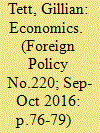

|
|
|
| 15 |
ID:
105511


|
|
|
| 16 |
ID:
044146
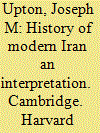

|
|
|
|
|
| Publication |
Cambridge, Harvard University Press, 1965.
|
| Description |
vi, 164p. pbk
|
|
|
|
|
|
|
|
|
|
|
|
Copies: C:1/I:0,R:0,Q:0
Circulation
| Accession# | Call# | Current Location | Status | Policy | Location |
| 000533 | 955.052/UPT 000533 | Main | On Shelf | General | |
|
|
|
|
| 17 |
ID:
144017
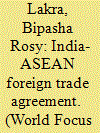

|
|
|
|
|
| Summary/Abstract |
New Delhi’s economic policy pursues a dynamic interaction with other countries deepening its commitment towards its goals to deepen and secure national economy, political security and regional integration. ASEAN (Association of South East Asian Nations) in this stance has been a crucial link towards providing regional cooperation among member nations and India. There is little doubt over China’s already grown influence in the South Asia and Asia- Pacific region with it showcasing its hard power status politically and militarily.
|
|
|
|
|
|
|
|
|
|
|
|
|
|
|
|
| 18 |
ID:
129937
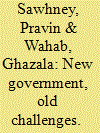

|
|
|
| 19 |
ID:
152179
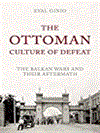

|
|
|
|
|
| Publication |
London, C Hurst and Co. (Publishers) Ltd., 2016.
|
| Description |
xix, 377p.: imageshbk
|
| Standard Number |
9781849045414
|
|
|
|
|
|
|
|
|
|
|
|
Copies: C:1/I:0,R:0,Q:0
Circulation
| Accession# | Call# | Current Location | Status | Policy | Location |
| 058997 | 954.015/GIN 058997 | Main | On Shelf | General | |
|
|
|
|
| 20 |
ID:
089973
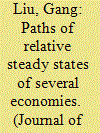

|
|
|
|
|
| Publication |
2009.
|
| Summary/Abstract |
In this paper, an economy means a national economy; an economy's relative steady state means an economy's steady state of per-capita output relative to the mean of those of a broad set of economies. This paper provides a method used not only to get the path of an economy's relative steady state, but also to assess whether an economy's relative steady state changed between two given periods and whether an economy's relative steady state in a given period differed from another economy's in the same or a different given period. This paper also shows the paths of relative steady states of six economies (China, India, South Korea, Taiwan, Japan and USA) using the estimates of their relative steady states in four successive periods (1960s, 1970s, 1980s and 1990s). A comparison of the paths gives valuable information.
|
|
|
|
|
|
|
|
|
|
|
|
|
|
|
|
|
|
|
|
|